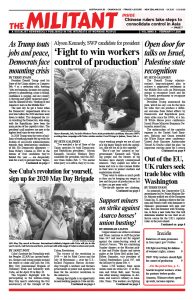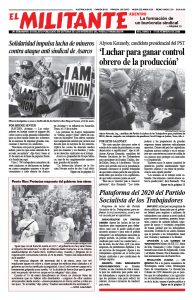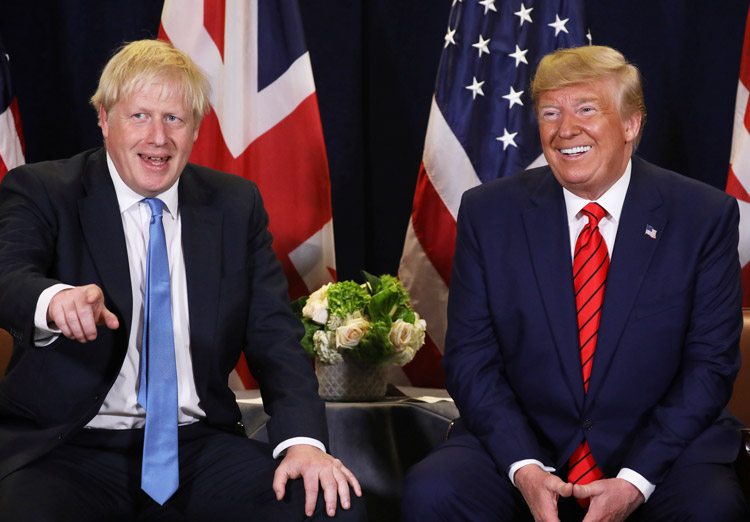As promised, the Conservative U.K. government led by Prime Minister Boris Johnson walked out of the European Union Jan. 31, dealing a blow to the German and French rulers who dominate it. Johnson’s government will now start talks, first and foremost with Washington, to form a new trade bloc that will determine whether he can chart an effective course for the U.K.’s capitalist rulers in the years ahead.
He says he will also fulfill his pledge to the largely working-class voters who put him in power to make their conditions of life better, a course that could result in a long-term shift in the political lineup in the U.K.
Millions of working people helped form a majority that voted for the U.K. to get out of the EU in a 2016 referendum, seeking to put an end to its intrusion into their lives and in opposition to the Conservatives, Labour and all the main capitalist parties that predicted a catastrophe if the U.K. quit.
For over three years those same parties along with the EU bureaucracy obstructed carrying out the 2016 vote, believing they should “correct” those who voted the “wrong” way. But Johnson defeated the “remain” wing of the Conservatives, taking over the party leadership, and routed the Labour Party in December’s election. He won by taking seats in largely working-class areas — especially in the north of England — that had been held by Labour for decades. He says he will redeem those “borrowed” votes by government borrowing to “level up” the areas of the U.K. where working people face greatest hardship.
Speaking on Jan. 31, Johnson said the U.K. getting out of the EU would usher in “a new era in which we no longer accept that your life chances … should depend on which part of the country you grow up in.”
He pointed to his government’s expanded funding for the National Health Service and promised the biggest round of infrastructure construction “since the Victorians.” He presents a different course to defend the rulers’ interests that is in contrast to that of previous Conservative leaders handed down from former Prime Minister Margaret Thatcher.
EU coming apart
The EU has been tearing at the seams long before the 2016 vote, as the French and German rulers squeeze the weaker capitalist powers, with devastating consequences for working people in Greece, Italy and elsewhere. For years the rulers in Germany sought to defend their interests as an imperialist power by relying on Washington’s military power and Berlin’s economic and political dominance of the EU. But no imperialist ruling class can remain dominant without their own military might to back it up.
The U.K. will no longer be represented at the EU’s parliament or any of its numerous agencies. Under the withdrawal agreement the U.K. can conclude trade deals with powers outside of the EU, but can’t implement them until the end of the year, the deadline for negotiations over terms of its exit from the EU’s customs union.
French President Emmanuel Macron attacked the millions of workers who voted for the U.K. to leave the EU Jan. 31, claiming that “lies” and “simplifications” determined the 2016 vote. But Johnson answers with a simple truth — the debate over “Brexit” is over. His government has ruled out any extension of the “transition period” in its talks with the EU. He said Feb. 3 the U.K. wouldn’t be bound by EU regulatory red tape in any future agreement.
Crawford Falconer, Johnson’s chief trade adviser, is urging London to strike a deal with Washington before it settles its future trade relations with the EU.
London also seeks to buttress an alliance with Washington by drawing in the governments of Australia, Japan and New Zealand. Simon Birmingham, the Australian government’s trade, tourism and investment minister, said Canberra aims to strike a deal with the U.K.
For U.K.’s capitalist rulers such a package would be a formidable international competitor, far more advantageous than its friction-filled and bureaucratic ensnarlment with the EU. British imperialism remains a sizable economic and military power. The combined gross domestic product of the U.S., Canada, Australia and the U.K. is twice as large as China’s and 150% bigger than what’s left of the EU after the U.K. leaves.
In 2017 the U.K. was the world’s sixth largest capitalist economy, according to the World Bank, with investment in the country growing faster than in France and Germany in 2018.
While the British rulers have let their military forces decline, London remains an important ally of Washington — the world’s dominant imperialist power. The countries’ rulers maintain a high level of integration between their forces.
In 1973 the U.K. joined the EU’s predecessor, the Common Market, set up years earlier by the German and French rulers in an effort to create a counter to their U.S. rival. It was always intended to become a kind of capitalist superstate, something that is impossible under the conflicts between ruling classes inherent to capitalism.
In fact, the EU bureaucracy has massively extended its interference into countries in the bloc since it was founded. A common currency was added among 19 European countries that strengthened the dominance of Berlin and, to a lesser degree Paris, against the weaker capitalist powers.


